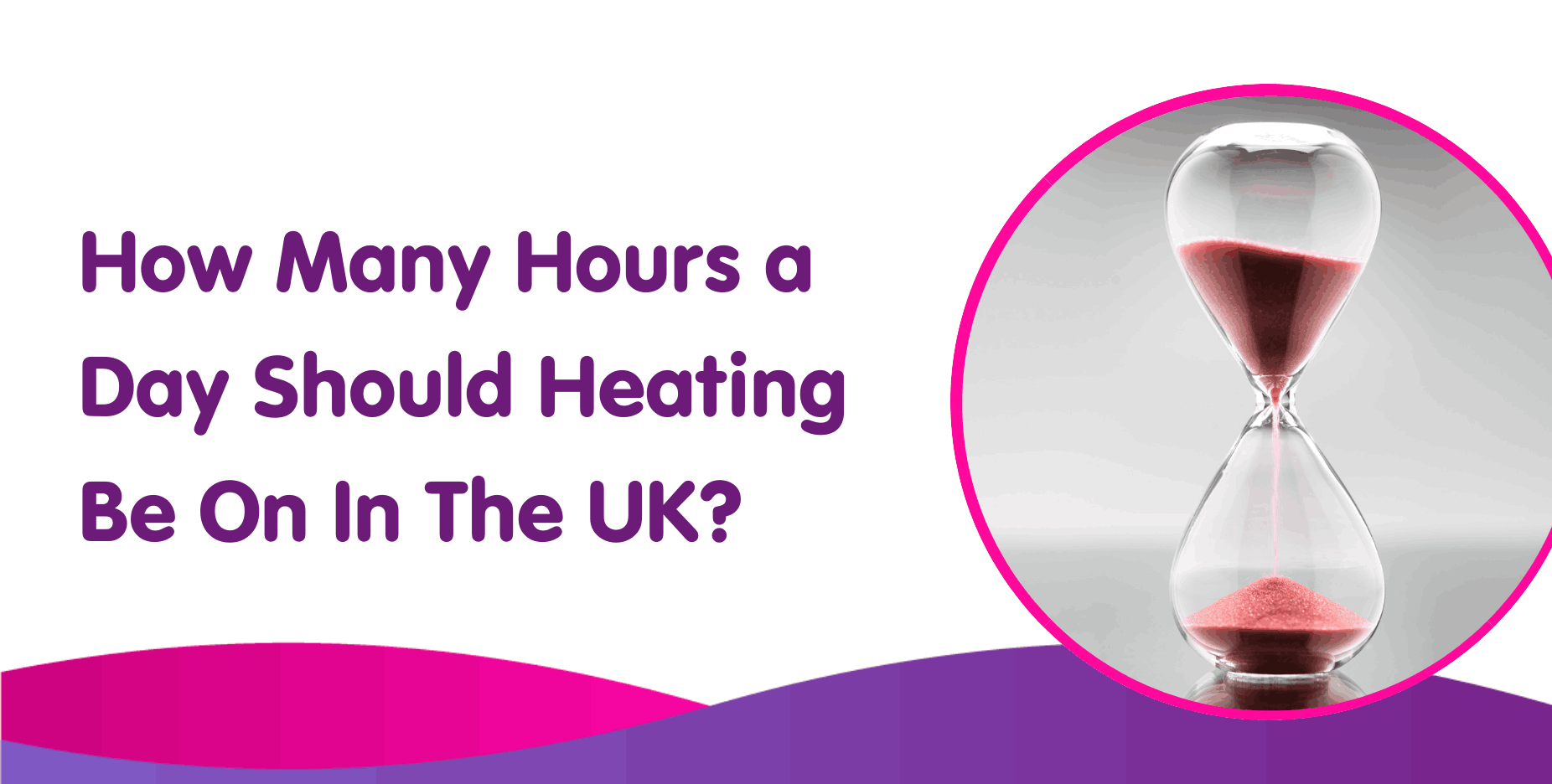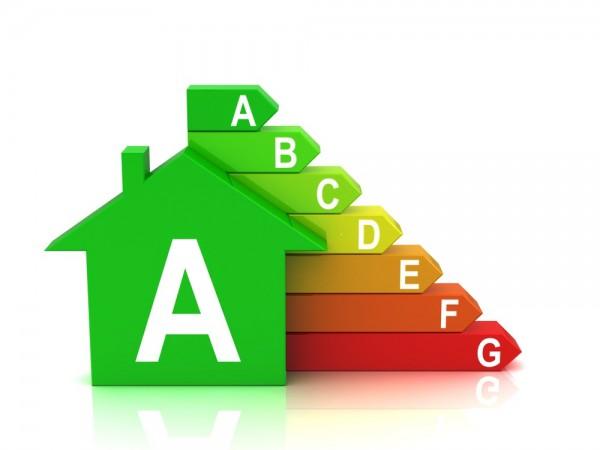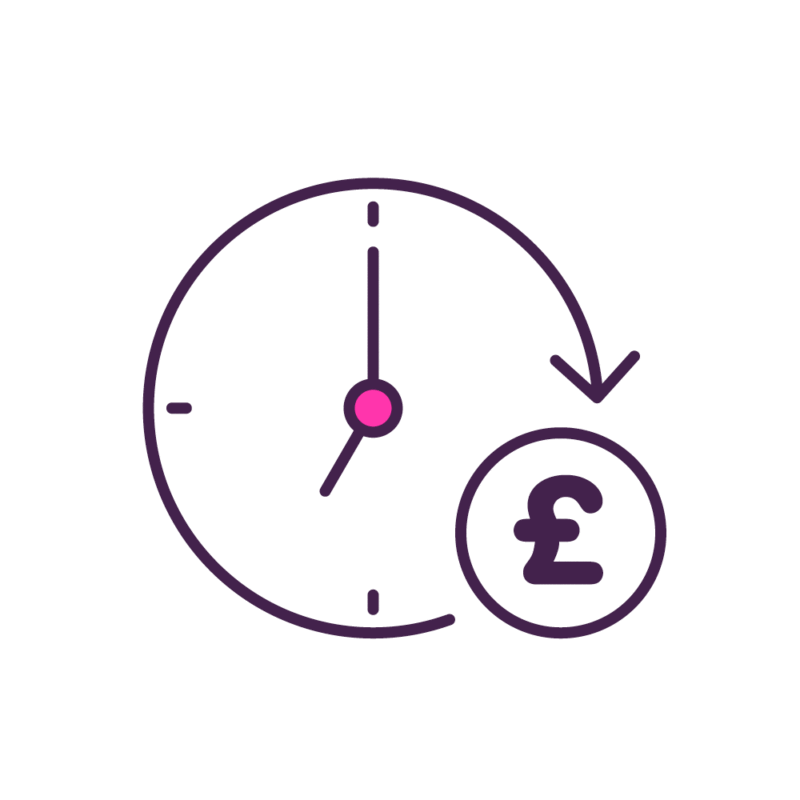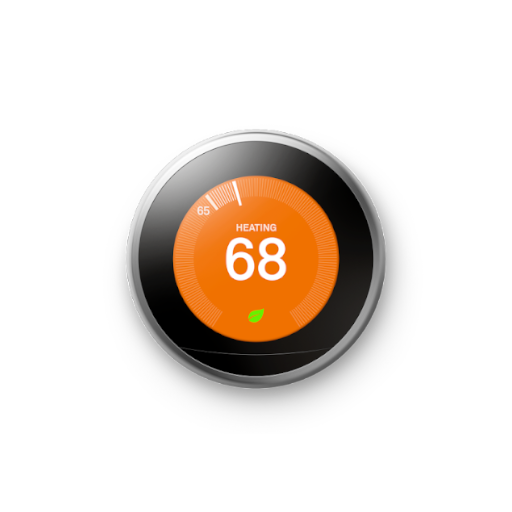How Many Hours a Day Should Heating Be On In The UK?

As the temperature drops and the days get shorter, many of us find ourselves reaching for the thermostat to turn up the heat.

However, with energy bills on the rise in the UK, it’s important to consider how many hours a day your heating should be on to keep your house comfortable without breaking the bank.
Finding the right balance between warmth and efficiency can be a challenge, but with a few simple tips and tricks, you can make sure your heating system is working for you, not against you.
In this post, we’ll explore some key factors to consider when determining how many hours a day your heating should be on in the UK, so you can stay cosy and save money all winter long.
Looking to save money? See how to increase boiler efficiency in our guide here
Get an online fixed price in 20 seconds:
What are the recommended hours of heating per day in the UK

While there is no one-size-fits-all solution for how long your heating should be on, a general guideline for most homes is 8-10 hours per day. However, this guideline can vary based on the factors mentioned above.
For example, a well-insulated home may only need heating for 6-8 hours per day, while a larger home may require 10-12 hours. It’s important to take these factors into account when deciding on a heating schedule that’s right for your house.
Want to know more? read about how central heating works here
Central heating tips for maximising efficiency and comfort

To maximise the efficiency and comfort of your central heating, consider using a programmable thermostat. (See how to use a thermostat here). This type of thermostat allows you to set different temperatures for different times of the day, ensuring that your heating only runs when needed.
Additionally, keeping windows and doors closed when heating can prevent heat loss and save more energy. Other tips include using draft stoppers to prevent cold air from entering your home and regularly maintaining your heating equipment to ensure it’s running efficiently.
Get an online fixed price in 20 seconds:
When is the best time to put heating on?

There are certain times when you may not need the heating on, such as when you’re sleeping or out of the house for work. For maximum energy-saving and keeping central heating running costs down, turning off your heating at night or when you’re away from home can help save energy and lower your bills.
Typically, temperatures tend to be lower in the morning and after sunset, which may be when you’re more likely to need the heating on. On the other hand, scheduling the heating to come on just before you return home from work or a day out can be helpful.
Best heating time schedule for winter months
If you are looking for a great schedule of when to turn your central heating on then here is a good option according to our Boiler Central heating experts that is widely used by people across the UK who work a regular 9 till 5 week.
| Schedule Day | Morning setting | Evening setting | Total Hours |
| Monday | 5.45am – 7am | 4.45pm – 6pm | 2.5 Hours |
| Tuesday | 5.45am – 7am | 4.45pm – 6pm | 2.5 Hours |
| Wednesday | 5.45am – 7am | 4.45pm – 6pm | 2.5 Hours |
| Thursday | 5.45am – 7am | 4.45pm – 6pm | 2.5 Hours |
| Friday | 5.45am – 7am | 4.45pm – 6pm | 2.5 Hours |
| Saturday | 6.30am – 8am | As and when | 1.5 Hours |
| Sunday | 6.30am – 8am | As and when | 1.5 Hours |
This is a basic guide and you can read more about the best heatings schedules here, as people do get up at different times and this doesn’t take into consideration colder days when you may need to leave the heating on a little longer, especially at weekends when you are more likely to be in your home and require the heating to be on to be comfortable.
Get an online fixed price in 20 seconds:
What affects how long heating is on for?

As a heating expert, I found out the number of hours a day that your heating should be on depends on several factors, including:
- The size of your house
- Amount of insulation
- Times people are at home
- Your preferred temperature
- And the cost of gas in your area
How long should heating be on in winter?
As a general guideline for UK homes during the winter, it is recommended to have the heating on low for an average of 7-8 hours per day. It is not necessary to keep the heating on all the time, especially at night when you can turn it down to save on expenses.
Additionally, new energy-efficient combi boilers are efficient enough to warm up the house quickly in the morning, so you can turn the heating off at night and back on in the morning.
Think your old combi boiler is costing you money? Check out the latest best combi boilers in this guide.
How long should heating be on in summer?

During the summer months, when the weather is warmer, you typically don’t need to use your heating as much. In fact, in many cases, you may not need to use it at all.
If you live in an area where the temperature stays consistently warm during the summer, you can turn your heating off completely.
If you live in an area where the temperature can fluctuate or gets cooler at night, you may want to turn your heating on for a short period each day, such as half an hour in the morning or evening, just to take the chill off the air.
Get an online fixed price in 20 seconds:
Should you leave your heating on all day?

The question of whether to it is cheaper to leave your heating on low all day is a common one. But according to the Energy Saving Trust, it’s not necessarily cheaper as it leads to constant energy use.
Your home generally loses a certain amount of heat throughout the day, and the amount depends on the insulation quality.
If your house is well insulated, leaving the heating on low all day may be a viable option, as long as heat isn’t escaping from windows or walls.
The best way to determine whether this is the right move for you is to try it over a few days and see if you can keep the temperature in your home at a reasonable level before turning the heating on and off frequently.
What can affect how long your heating is on?
The way we heat our homes has a significant impact on our planet, and our wallets. By making a few changes to the way we manage our heating usage, we can reduce our energy consumption and save more money in the process.

Insulation
Firstly, let’s talk about insulation. A well-insulated home can help to keep the heat in and prevent it from escaping through the walls, windows, and roof. This means less energy is required to keep your home warm, and your heating bills will be lower as a result. So, let us take action, and properly insulate our homes!
Regular boiler servicing maintenance

Next, let us talk about the importance of regular maintenance, including for central heating systems. Ensuring that our central heating systems are well-maintained and operating efficiently can help to reduce our energy consumption and lower our bills.
For example, we should check and clean the central heating system’s components, such as the boiler, radiators, and pipes, to ensure they are working efficiently.
Over time, these components can become clogged with debris and sediment, causing the system to work harder to produce heat, which can lead to increased energy consumption and higher bills.
Boiler servicing costs are relatively low in comparison to high energy bills and repair costs.
Get an online fixed price in 20 seconds:
Consider upgrading your boiler

Finally, we can consider upgrading to your boiler. If you have an older boiler, it may not be as efficient as newer models, and upgrading to a newer, more efficient boiler could help you save money in the long run.
Look for boilers with high energy efficiency ratings, such as those with an A rating, and consider investing in a gas condensing boiler, which is designed to capture and reuse heat that is normally lost during the heating process.
Read our guide on the latest boiler costs here.
Check for drafts:
Drafts can significantly impact the efficiency of your heating system, as they allow warm air to escape and cold air to enter. Check for drafts around windows and doors, and consider sealing them with weatherstripping or caulking to keep the heat in and lower your energy consumption.
Use natural light:
Take advantage of natural light during the day to heat your home naturally. Open curtains or blinds on south-facing windows to allow sunlight to enter and warm up your living space. This can help to reduce your reliance on artificial heating, and lower your energy consumption as a result.
Use Thermostatic Radiator Valves:
By using thermostatic radiator valves, you can better understand how to heat your home. These valves allow you to control the heating of each room separately, which can help you save money by only heating the rooms that you’re using.
It’s also important to think about how many hours a day you’re using your heating. Turning down the heat when you’re not at home or when you’re sleeping can save a significant amount on your energy bill.
By implementing these strategies, you can reduce your bills, manage your usage more efficiently, and contribute to a more sustainable future.
Get an online fixed price in 20 seconds:
Choosing the Right Temperature for Your Home to lower heating bills
Finding the right temperature for your home can be a tricky balancing act. On one hand, you want to be comfortable and warm, but on the other hand, you don’t want to waste money on energy bills. Fortunately, there are a few tips and tricks that can help you find your comfort zone while still saving money.
Data shows that the most economical temperature for your home is between 18-21°C. By setting your thermostat to this temperature, you can save on energy bills without sacrificing your comfort. Energy prices can fluctuate throughout the year, so it’s important to keep an eye on the average outside temperature and adjust your thermostat accordingly.
Occupied rooms should be kept at a comfortable temperature, but you can save money by turning down the heat in unoccupied rooms. Heat rises, so if you have a loft space, it’s important to make sure it’s properly insulated to prevent heat from escaping.
Adding loft insulation and double glazing can also help keep your home warm while reducing your heating costs.
According to the World Health Organisation, it’s recommended to keep your home at a temperature of at least 18°C, particularly for those with respiratory diseases or health conditions. If you’re feeling cold, try using a hot water bottle or an electric blanket for a few hours rather than turning up the heat for the whole house.
When you arrive home, it may be tempting to turn up the heat to full blast to warm up quickly. However, this can lead to higher energy bills and isn’t necessary. It makes sense to aim for a comfortable temperature rather than a very warm temperature. A general rule of thumb is to aim for a happy medium that is comfortable for you and your household.
It’s important to consider the costs of heating your home, particularly in the UK where the running costs of boilers and radiators can be high. Gas is a popular heating option, but it’s important to keep an eye on costs and usage.
Consider the hours that you’re using your heating, because if you’re only using it for a few hours a day, it may be cheaper to leave it on low rather than turning it off completely and then heating the house from scratch.
Ultimately, finding your comfort zone when it comes to the temperature of your home requires some experimentation and a bit of trial and error.
Keep an eye on your energy bills and adjust your thermostat as needed to find the right balance between comfort and cost. On a cold winter’s day, it’s important to stay warm, but with the right techniques, you can do so without breaking the bank.
Get an online fixed price in 20 seconds:
How to Keep Your Heating System Running Smoothly

To keep your heating running smoothly and avoid a high energy bill, it’s important to consider several factors. Firstly, be mindful of how much energy you’re using – even reducing usage by a small amount can make a difference. You can also save energy by turning the heating off after half an hour, or by only heating the rooms you’re in rather than the entire house.
For the average UK household
For the average UK household, the ideal temperature is around 18-21 degrees Celsius, and it’s recommended to set your thermostat to this level. If you’re using your heating for eight hours or more each day, it’s important to ensure your radiators are functioning properly, and keep a radiator key handy in case you need to release any trapped air.
During the winter months:
During the winter months, you might notice that the sun dips earlier, making it more tempting to leave your heating on all the time. By adding insulation to your home, you can retain the same amount of heat for longer, and reduce your energy consumption.
If you have a health condition or are experiencing a cost of living crisis:
If you have a health condition or are experiencing a living crisis, it’s essential to keep your home warm. Even increasing the temperature by a single degree can make a difference. However, it’s important to consider the cost – if you’re struggling to pay your energy bills, there may be assistance available.
Overall, to keep your heating running smoothly, it’s important to be mindful of your energy usage and make small adjustments where possible.
Keep an eye on your energy bill, and consider whether your boiler, gas, and radiators are functioning correctly. With an average of around 7 hours of heating per day in the UK, it’s essential to make sure you’re using your heating as efficiently as possible.
Get an online fixed price in 20 seconds:
Conclusion:
Determining how many hours a day your heating should be on is crucial in striking the perfect balance between comfort and cost.
By considering the factors that influence your heating schedule and following the recommended guidelines and tips, you can keep your home warm and comfortable while saving energy and money. Remember to regularly assess your heating schedule to ensure it’s still appropriate for your home’s needs.
Get an online fixed price in 20 seconds:


